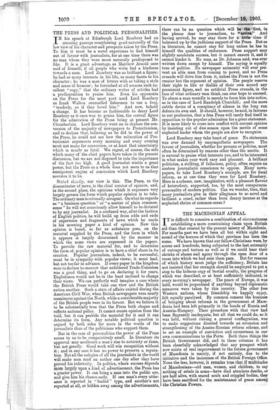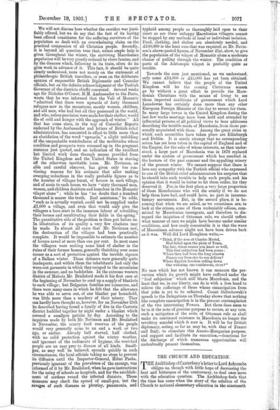THE MACEDONIAN APPEAL.
TT is difficult to conceive a combination of circumstances establishing a more constraining claim upon British aid than that created by the present misery of Macedonia. For months past we have been all but within sight and sound of the horrors of which that province has been the scene. We have known that our fellow-Christians were, by scores and hundreds, being subjected to the last extremity of outrage and torture as well as if we could hear their shrieks of shame and agony through the open door of a room into which we had seen them pass. But for reasons of which history must judge the sufficiency, Britain has not insisted that her strength should be employed to put a stop to the hideous orgy of bestial cruelty, the progress of which was described, or at least sufficiently indicated, in every morning's newspaper. The peace of Europe, it was held, would be jeopardised if anything beyond diplomatic measures were taken by this country. The other free Western nations, whose friendship we happily enjoy, felt equally paralysed. By common consent the business of bringing about reforms in the government of Mace- donia had been left primarily in the hands of Russia and Austria-Hungary. Their procedure with that view had been flagrantly inadequate, but all that we could do, so it was held, without risking a general conflagration, was to make suggestions directed towards an extension and strengthening of the Austro-Russian reform scheme, and to set an example of conviction and earnestness in our own communications to the Porte. Both these things the British Government did, and in these columns it has been cheerfully acknowledged that any prospect which now exists of real improvement in the future government of Macedonia is mainly, if not entirely, due to the initiative and the insistence of the British Foreign Office. None the less, however, it remains true that if multitudes of Macedonians—old men, women, and children, to say nothing of rebels in arms—have died atrocious deaths, or are half alive, with seared souls and crippled bodies, they have been sacrificed for the maintenance of peace among the Christian Powers. We will not discuss here whether the sacrifice was justi- fiably offered, but we do say that the fact of its having been offered constitutes. for the suffering survivors of the population so dealt with an overwhelming claim, on the practical compassion of all Christian people. Secondly, it is beyond all question true that, unless ample help is given throughout the winter, the surviving Macedonian population will be very greatly reduced by sheer famine,.and by the diseases which, following in its, train, often do its grim work in advance of it. This fact, it should be quite clearly understood, rests not merely on the statement of philanthropic British travellers, or even on the deliberate opinion of responsible British Diplomatic and Consular officials, but on the definite acknowledgment of the Turkish Governor of the districts chiefly concerned. Several weeks ago Sir Nicholas O'Conor, H.M. Ambassador to the Porto, wrote, that he was informed that the Vali of Monastir 41 adthitted that there were upwards of forty thousand refugees now in the mountains, mostly women, children, and old men, who had lost all they possessed in the world, find who, unless provision were made for their shelter, would die of cold and hunger with the approach of winter." All that has come since, in the way of Consular Reports endorsed by the Ambassador and letters of. British relief administrators, has amounted in effect to little more than an elucidation of the word "upwards," upwards," a slight unfolding of the unspeakable wretchedness of the multitudes whose condition and prospects were summed up in the pregnant 'entence just quoted, and an indication of the excellent hut limited work done through means provided from the United Kingdom and the United States in staving off the otherwise inevitable issue. Mr. Nevinson, an able and careful observer, has given only too con- tincing reasons for his estimate that after making sweeping reductions in the really probable figures as to the number of villages burnt, of houses in each village, and of souls to each house, we have "sixty thousand men, women, and children destitute and homeless in the Monastir vilayet alone " ; while he has " no doubt that a hundred thousand is nearer the truth. Real assistance," he adds, "stick as is actually wanted, could not be supplied under £1,000 a village, and even that would only give the Villagers a bare start in the immense labour of rebuilding their houses and recultivating their fields in the spring." The quantitative side of the problem is thus put before us. In illustration of its quality a very few citations may be made. In almost all cases that Mr. Nevinson saw, the destruction of the villages had been practically Complete. It would be impossible to estimate the number of houses saved at more than one per cent. In most cases the villagers were seeking some kind of shelter in the *kilns of their former homes, generally thatching over some Corner as a sort of protection against the terrible rigours 9f a Balkan winter. These defences were generally quite inadequate, and within them the inhabitants had only the worn-out garments in which they escaped to the mountains in the summer, and no bedclothes. In the extreme western district of Malesia, Mr. Brailsford made it his first care at the beginning of November to send up a supply of blankets to each village ; but Bulgarian families are numerous, and there were many cases in which he felt that the allowance he was able to serve out, of one blanket per household, Was little more than a mockery of their 'misery. They can hardly have thought so, however, for on November 25th he described having found a family of five in the Castoria district huddled together by night under a blanket which covered' a smallpox patient by day. According to the inquiries made by both Mr. Nevinson and Mr. Brailsford in November, the scanty food reserves of the people would very generally come to an end a week or two ago, or earlier. Already half starved, half clothed, With no solid protection against the wintry weather, and ignorant of the rudiments of hygiene, the wretched people are an easy prey to disease of all kinds. Small- pox, as may well be 'believed, spreads quickly in such circumstances, the local officials taking no steps to prevent its diffusion until the Inspector-General, Hihni Pasha, previously ignorant of the prevalence of the scourge, was informed of it by Mr. Brailsford, when-he gave instructions for the using of schools as hospitals, and for the establish: remit of cordons round the infected districts. These Measures may check the spread 'of small-pox, ' but- the ravages of such diseases as pleurisy,• pneumonia, and typhoid among people so thoroughly laid open to their onset as are these unhappy Macedonian villagers cannot be stopped by any methods of local or individual isolation. Food, clothing, and shelter are absolutely needed, and £100,000 is the least sum that was required, as Mr. Nevin- son's above-quoted figures, of November 21st, show, to give the population of the vilayet of Monastir alone a moderate chance of pulling through the winter. The condition of parts of the Adrianople vilayet is probably quite as terrible.
Towards the sum just mentioned, as we understand, only some £14,000 or £15,000 has yet been obtained. We cannot believe that the people of the United Kingdom will let the coming Christmas season go by without a great effort to provide the Mace- donian Christians with the means of living to see those improved conditions of government which Lord Lansdowne has certainly done more than any other European Foreign Minister of the day to secure for them. In many large towns in the United Kingdom during the last few weeks meetings have been held and attended by influential persons of all political views to hear addresses describing the terrible needs of Macedonia, from those per- sonally acquainted with them. Among the great cities in which such assemblies have taken place are Edinburgh and Dublin. It is surely strange that no corresponding action has yet been taken in the capital of England and of the Empire, for the sake of whose interests, as then under- stood, a large part of Macedonia was in 1878 replaced under the system of government which has resulted in the horrors of the past summer and the appalling misery of the present winter. We cannot suppose that there is here any sympathy with the Turkish official who expressed to one of the British relief administrators his surprise that he should take such trouble to help such people, and his opinion that it would be better to let them suffer, for they deserved it. For, in the first place, a very large proportion of those Macedonians who will die cruelly if we do not help them have had, and could have, no part in insurree, tionary movements. But, in the second place, it is be- coming that when we are asked, as we sometime are, to look at the crimes, some of them undeniably odious, com- mitted by Macedonian insurgents, and therefore to dis- regard the iniquities of Ottoman rule, we should reflect what manner of men we might have become under similar conditions, and how easily conceivable it is that the wave of Mussulman advance might not have been driven back as it was. Well did Lord Houghton write,— "Think, if the arm of Charles Martel,
Had failed upon the plain of Tours, The fate, whose course you know so well, This foul subjection had been yours : Where then had been the long renown France can from sire to son deliver?
Where English freedom rolling down One widening, one continuous, river?"
No race which has not known it can measure the per- version which its growth might have suffered under the "foul subjection" which still blasts Macedonia, and the least that we, in our liberty, can do is with a free hand to relieve the sufferings of those whose emancipation from that yoke is yet to be achieved. Count Goluchowski's speech to the Delegations on Thursday shows that nothing like complete emancipation is in the present contemplation of the two intervening Powers. But there does seem to be in it the note of genuine purpose to secure, at any rate, such a mitigation of the evils of Ottoman rule as shall make its continued existence in Macedonia no longer the revolting scandal which it now is. It will be for British diplomacy, acting, so far as may be, with that of France and Italy, to stimulate this Austro-Hungarian purpose, and support and facilitate its execution,—functions for the discharge of which numerous opportunities will undoubtedly present themselves.



















































 Previous page
Previous page